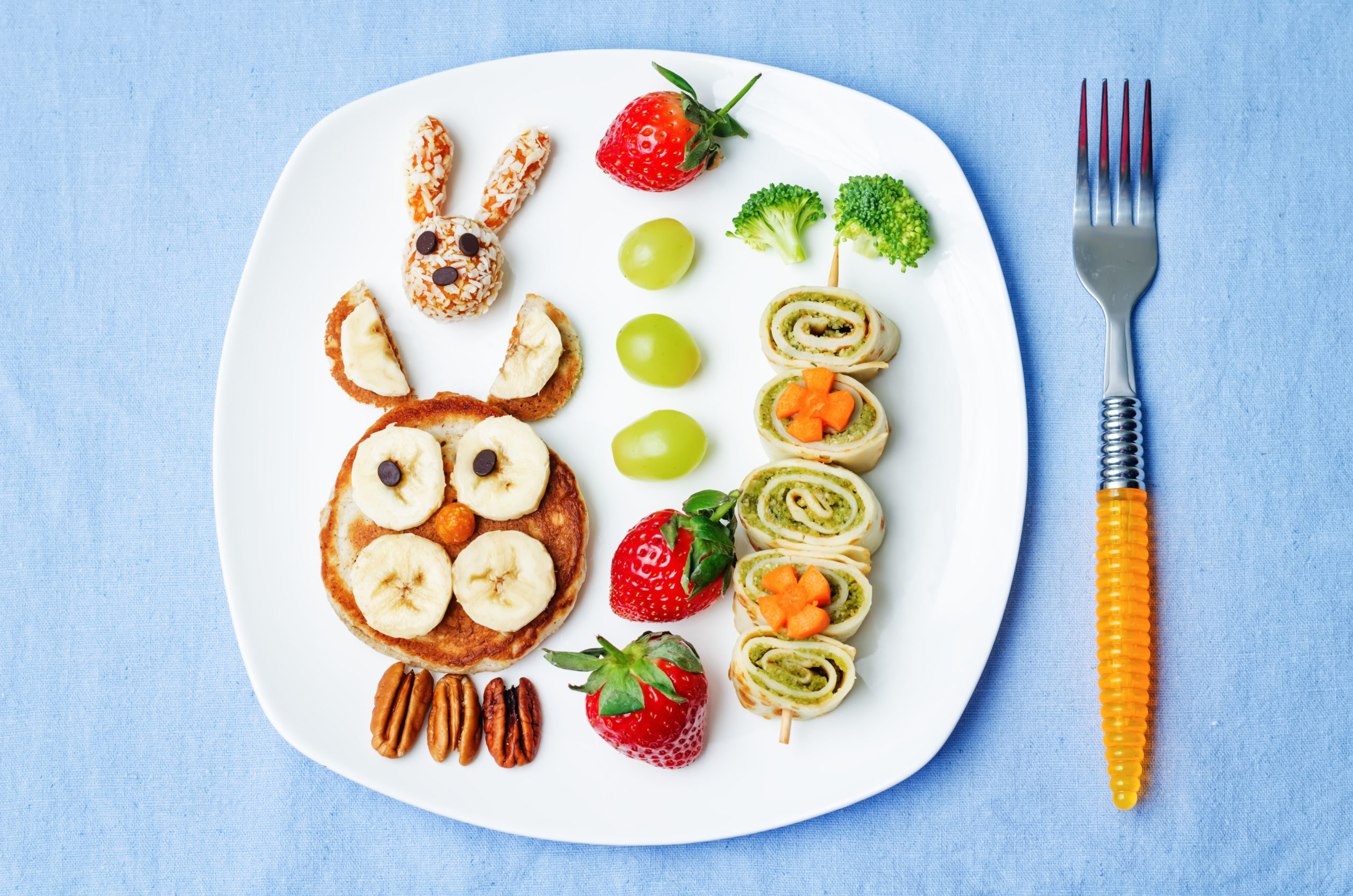23 Practical Tips For Parents Of Picky Eaters

“I would never let my kids do that!” How many of us spoke those words with such confidence before we became parents? That’s when it’s easy to pass judgement on other families and think you know exactly how you would do things differently.
As a lifelong member of the health community, I thought my kids would naturally love munching on raw kale and abhor anything boxed. Obviously. Because they were my kids.
Then I had kids and I had to eat my words. What do you do when you find yourself with a toddler who only loves two different foods, and both of them are different forms of bread?
As a functional medicine practitioner, I see on daily basis the power of the foods we eat. The foods our children are eating today are the building blocks for the rest of their lives, so what do you do when your stubborn young children absolutely refuse to put anything with a color (not green, not red, not blue…) into their mouths? You learn the subtle art of health food seduction. Try these 23 tips to help turn your picky eater into a kid who eats healthful food….and actually likes it!
Article continues below
Make Your Life a Cleanse
SUBSCRIBER-ONLY GUIDES FOR GUT HEALTH, VIBRANT ENERGY, HEALTHY FOOD & CLEAN ALCOHOL
Get FREE access to these + giveaways, recipes, & discount codes in personal emails from Dr. Will Cole.
Tips For Picky Eaters
Here are my best tried and true tips for getting your kids into more diverse and healthier food!
1. Shop Wisely
This might be a surprise to some of us parents, but the truth is that we are the ones buying the food and putting it in the fridge and pantry. If there is junk food in the house, who put it there? Not your toddler. And if there’s no junk food in the house, well then, obviously our kids can’t have it, or argue for it, or sneak it. Fill your fridge and cupboards with real food. After the initial shock has worn off, your kids will begin to accept that what they see is what they get because that’s what’s available.
2. Reduce the Snacks
Kids who snack too much throughout the day are often not hungry enough to eat dinner, let alone try new foods. When kids are bored, they often interpret that unpleasant feeling as hunger because in many ways, food is entertaining.
Redirection to activities that aren’t about food can be healthier for kids and also help them work up a good appetite for dinner. Snacking (as well as refusing new foods) is a habit that can be broken.
When kids don’t snack, they are more likely to come to the dinner table with an appetite and a more adventurous spirit. When snacks are necessary, avoid or minimize fruit juices, because kids’ little stomachs can easily fill up on this glorified sugar water, leaving little room for food with more nutrients. If they’re genuinely hungry in between meals, they may just need to eat more during mealtime. Or, let snacks be whole fruits and veggies only.
3. Have a "One Bite" Rule
As regularly as possible, my wife and I try to introduce foods our kids haven’t tried before. The rule is that they have to try at least one bite of the new food. They might hate it, but sometimes, with consistency, that one bite turns into 10. There are few things sweeter to a parent’s ears than a young child saying “Hey, this is good!”
4. Rebrand the "Yuck" Foods
When a child doesn’t like the taste of a new food, don’t make a big deal about it or regularly say things like “Sophia doesn’t like broccoli.” Instead, meet that “yuck” face with indifference and a comment that puts that healthy food in a positive light, such as, “That’s okay. I guess your taste buds aren’t ready for that just yet. Maybe when you are a little older, you’ll realize how good it is.”
This suggests that liking broccoli is a goal, not an impossibility. I have patients who are in their 50s who still tell themselves they don’t like a food they tried 40 years ago and haven’t tried since. What a waste of an opportunity for dietary diversity!
5. Cook Together
Involving your kids with simple little tasks, like mixing or measuring ingredients, can give them a sense of accomplishment and a desire to try their creation. It also educates them about preparing healthy foods and establishes that cooking at home (rather than take-out or drive-thru) is what’s normal.
6. Minimize the Choices
The worst food-related question you can ask a toddler is, “What do you want to eat?” Instead, pick two or three options so they can assert their independence without feeling overwhelmed by too many options. “Do you want carrots or blueberries for your snack?” “Do you want green beans or a little salad with your chicken?” “Do you want a banana or some grapes for dessert?”
7. Accentuate the Positive
Shift their perspective (and yours!) from what they can’t eat to all the many wonderful things they can eat.
8. Don't Make Dessert a Food Group
Desserts are great for special occasions and healthy desserts should be enjoyable, but there is no reason to have dessert at every meal, nor to make dinner a bribe to get sugar later. This sets up a dangerous health precedent when kids need a piece of cake or cookies after every meal. Dinner should be its own reward, but to help break the dessert habit, you could start by making a fun family activity the “reward.”
9. Don't Ban Everything
Many people lump foods into “good” and “bad” categories and feel that they should never, ever eat the “bad” foods, but kids are resilient and tend to have healthy active bodies that can handle the occasional less-than-perfect treat. As long as they eat healthy food most of the time, there is no reason to be so rigid that it restricts life and social activity. Besides, studies have shown (1) that children who are excessively restricted with foods are more likely to overeat when they’re alone.
10. Get Active In Your Local Food Community
Taking your little one to a local, sustainable farm or farmers’ market lets them see the place their food comes from, and many of these places have fun activities to get kids interested in whole food.
We’re often so removed from the source of the food we eat that providing a memorable experience will educate and enlighten their inquisitive minds, not to mention give them a chance to help choose new foods and come away with a positive impression of whole food that comes from the earth rather than the store.
11. Don't Be Confusing About Nutrition
Keep food benefit conversations at the level of the child. No need for a lecture on omega-3 fatty acids or blood sugar stability (although, I do get tempted…) Instead, talk in simple terms about what foods do for kids, like “Avocados make your brain work better so you can be really smart,” or “This fish will help make your muscles strong!”
Also, have age-appropriate but honest conversations about what junk food does to the body, like “Did you know sugar will make you tired and might make you get sick more often?” or “French fries can clog up your heart so you can’t run as fast.”
12. Make Whole-Food Smoothies
Kid-friendly smoothies are a great way to get a lot of nutrient-dense foods into your growing children. Blend foods like coconut milk and coconut oil, avocados, probiotics (empty a capsule or use kefir), and leafy greens with some frozen berries and cacao powder and you’ll have a yummy, ice-cream-like drink that will actually nourish your kids.
13. Use Grain-Free Alternatives
Nobody needs gluten, and kids can be sensitive to it, so try using gluten- and grain-free alternatives like almond and coconut flours for anything you would cover in breading (like chicken nuggets), or bake (like muffins or cookies). You might notice a positive difference in your child after removing gluten.
14. Sneak In the Good Stuff
To get a wider variety of vegetables in your children’s diet, try mashing cauliflower instead of potatoes, baking spaghetti squash instead of noodles, and if you eat meat, hiding nutrient-dense grass-fed liver in the sauce or the meatloaf.
15. Get Creative
Food can be fun….and even silly! Try arranging vegetables in the shape of a goofy face or making cars, boats, or animals out of cut-up fruit. This can be a simple way to charm your child into eating healthy foods.

16. Be Restaurant-Savvy
Eating out while adhering to healthy eating principles can be challenging for adults, let alone kids. Children’s menus typically offer some of the worst choices when it comes to health. Instead of relying on the kid’s menu, check out my tips for eating out here.
17. Create a Trade System
Sadly, school can be a place where your child eats a lot of junk food. My wife and I set up a trade system for this problem. When our kids are given an unhealthy treat at school or on the bus, they can choose not to eat it, bring it home, and trade it in for a healthy treat they love even more, that they might not normally get. The trick is to make your healthy treats more valuable than the junk food, as well as positive reinforcement for making a good food decision.
18. Let Them Know How Precious and Valuable They Are
Teach your kids to love themselves enough to nourish their bodies with good things. If we fully realized our unique gifts and potential, would we fill ourselves with junk? Every child is precious, of course, but many don’t know it because nobody every tells them. Tell them. I recommend doing so daily.
19. Don't Pass Along Your Bad Food Habits
Children are like sponges, absorbing the actions and attitudes of the people around them. I’ve had many conversations with patients about their picky children. In the same conversation I see a look of disgust on a parent’s face at the mention of a certain healthy food – the same food their child doesn’t want to eat! Remember that the proverbial apples don’t fall far from the proverbial trees. Be a healthy tree.
20. Improve Your Own Relationship With Food
This goes hand in hand with the last tip. As parents, it’s our responsibility to sort out our own baggage when it comes to food. Break the generational cycle of unhealthy eating patterns so that your kids can be free to enjoy good food without the psychological and emotional barriers you may have had to overcome.
21. Have Family Meals When Possible
I know life gets busy and family dinner isn’t always in the cards, but studies have shown (2) that children who eat together with their families tend to eat healthier foods than children who don’t. I’m the first to admit that I usually get home after sundown every weekday, but we always strive for family meals on the weekends.
But whenever you can, and preferably on some regular schedule, make a point to eat with your family. Turn off your cellphone and the television, set the table, sit down, and use that time to talk and connect with your kids while you nourish yourselves.
22. Learn About Nutrition
A lot of parents are well intentioned but overwhelmed with where to start. How do you teach healthy habits to kids when you aren’t sure what habits really are healthy? It’s never too late to learn.
23. Be Consistent and Patient
I wasn’t born yesterday and I know that these tips are not miracle cures for a picky eater. Some of them will work on some kids, and many of them will work on a lot of kids, but your child is an individual, so you may have to try multiple strategies to find what works.
In any case, as with anything in parenting, consistency and patience are two crucial qualities for you to have. Decide what is allowed in your house, keep offering options, and stay strong. Even when they rebel, kids almost always come back to what you taught them in the beginning.
As one of the first functional medicine telehealth clinics in the world, we provide webcam health consultations for people around the globe.
Photo: Stocksy
Read Next: The Best Home Remedies To Boost Your Child’s Immune System
Start Your Health Journey Today
FUNCTIONAL MEDICINE CONSULTATIONS FOR PEOPLE AROUND THE WORLD
References:
- Leann L Birch, Jennifer Orlet Fisher, Kirsten Krahnstoever Davison, Learning to overeat: maternal use of restrictive feeding practices promotes girls' eating in the absence of hunger, The American Journal of Clinical Nutrition, Volume 78, Issue 2, August 2003, Pages 215–220, https://doi.org/10.1093/ajcn/78.2.215
- Gillman MW, Rifas-Shiman SL, Frazier AL, et al. Family dinner and diet quality among older children and adolescents. Arch Fam Med. 2000;9(3):235‐240. doi:10.1001/archfami.9.3.235
Shop This Article
Purchase personally curated supplements
and Dr. Will Cole’s books!

The information on this website has not been evaluated by the Food & Drug Administration or any other medical body. We do not aim to diagnose, treat, cure or prevent any illness or disease. Information is shared for educational purposes only. You must consult your doctor before acting on any content on this website, especially if you are pregnant, nursing, taking medication, or have a medical condition.
Our articles may include products that have been independently chosen and recommended by Dr. Will Cole and our editors. If you purchase something mentioned in this article, we may earn a small commission.

BY DR. WILL COLE
Dr. Will Cole, DNM, IFMCP, DC is a leading functional medicine expert who consults people around the globe, starting one of the first functional medicine telehealth centers in the world. Named one of the top 50 functional and integrative doctors in the nation, Dr. Will Cole provides a functional medicine approach for thyroid issues, autoimmune conditions, hormonal imbalances, digestive disorders, and brain problems. He is also the host of the popular The Art of Being Well podcast and the New York Times bestselling author of Intuitive Fasting, Ketotarian, Gut Feelings, and The Inflammation Spectrum.

Gut Feelings
Healing The Shame-Fueled Relationship
Between What You Eat And How You Feel
